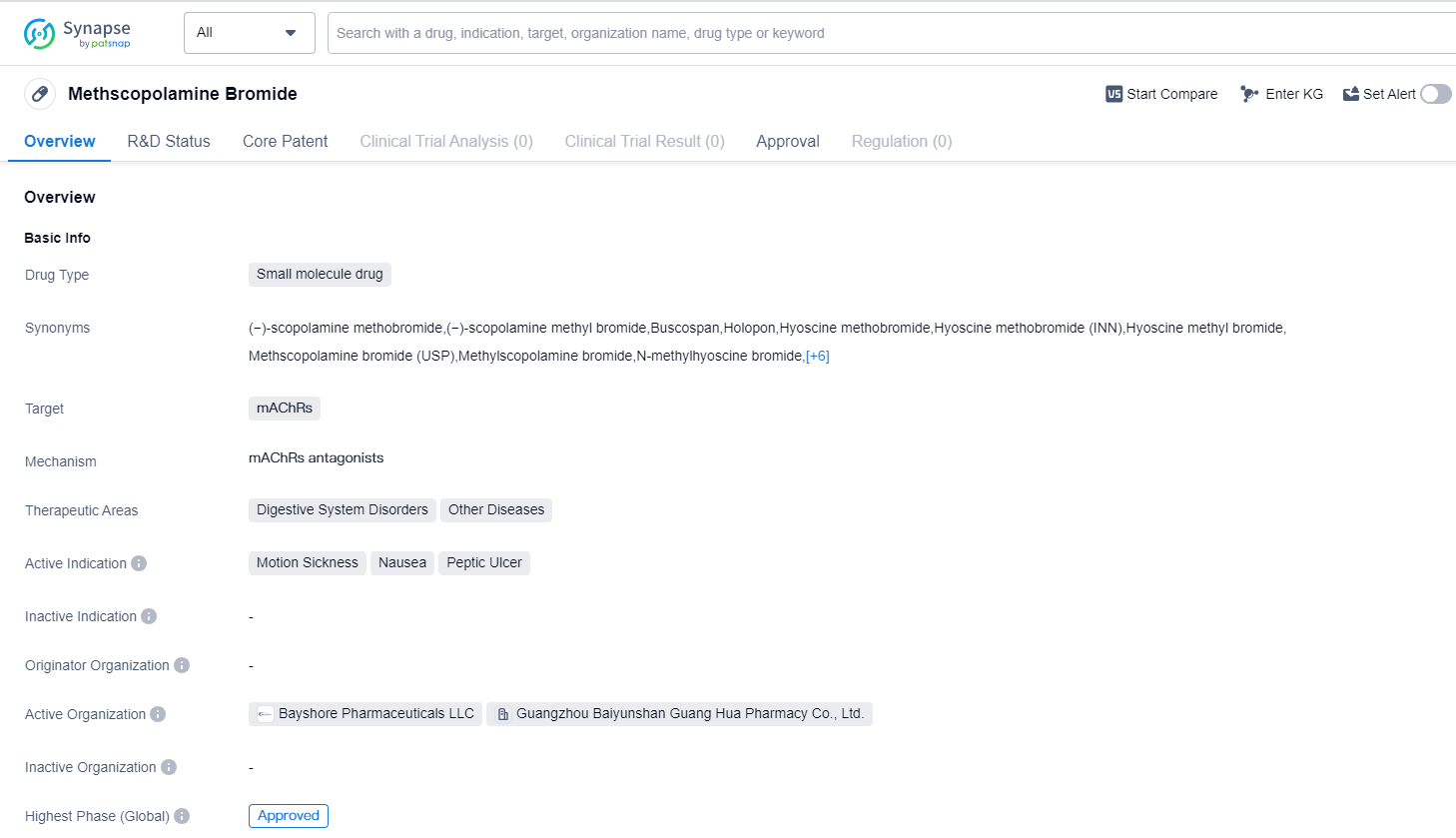Deep Scientific Insights on methscopolamine bromide's R&D Progress, Mechanism of Action, and Drug Target
Methscopolamine bromide's R&D Progress
Methscopolamine Bromide is a small molecule drug that primarily targets muscarinic acetylcholine receptors (mAChRs). It has been approved for use in the treatment of various digestive system disorders and other diseases. The drug is particularly effective in managing motion sickness, nausea, and peptic ulcers.
Methscopolamine Bromide was first approved for use in the United States in April 1953, making it one of the earliest drugs in the pharmaceutical market. Its approval in China also dates back to the same period, indicating its global recognition and acceptance. The drug has successfully completed all phases of clinical trials and has been granted approval for commercial use.
As a small molecule drug, Methscopolamine Bromide is designed to interact with mAChRs, which are receptors found in various tissues and organs throughout the body. By targeting these receptors, the drug can modulate the activity of acetylcholine, a neurotransmitter involved in the regulation of various bodily functions.
The therapeutic areas in which Methscopolamine Bromide is indicated include digestive system disorders and other diseases. This suggests that the drug may have a broad range of applications beyond its primary indications of motion sickness, nausea, and peptic ulcers. However, the specific details of these other diseases are not provided in the given information.
The fact that Methscopolamine Bromide has reached the highest phase of development which is approved globally. Its long history of use since 1953 further supports its established position in the pharmaceutical industry.
👇Please click on the image below to directly access the latest data (R&D Status | Core Patent | Clinical Trial | Approval status in Global countries) of this drug.
Mechanism of Action for methscopolamine bromide: mAChRs antagonists
mAChRs antagonists refers to muscarinic acetylcholine receptor antagonists. Muscarinic acetylcholine receptors (mAChRs) are a type of G protein-coupled receptors found in various tissues, including the central and peripheral nervous systems. They are activated by the neurotransmitter acetylcholine.
Antagonists, in the context of mAChRs, are substances that bind to the receptor but do not activate it. Instead, they block or inhibit the binding of acetylcholine to the receptor, thereby preventing its normal physiological effects. mAChRs antagonists are commonly used in medicine to treat conditions such as overactive bladder, gastrointestinal disorders, and certain types of respiratory diseases.
By blocking the activation of mAChRs, these antagonists can help reduce excessive cholinergic activity, which can lead to unwanted symptoms or conditions. They can selectively target specific subtypes of mAChRs, allowing for more precise therapeutic effects. The use of mAChRs antagonists requires careful consideration of their potential side effects, as they can also interfere with normal cholinergic signaling in other tissues and systems.
Drug Target R&D Trends for methscopolamine bromide
Muscarinic acetylcholine receptors (mAChRs) are a class of G-protein coupled receptors found in various tissues throughout the human body. They play a crucial role in mediating the effects of acetylcholine, a neurotransmitter involved in numerous physiological processes. mAChRs are involved in regulating heart rate, smooth muscle contraction, glandular secretion, and neuronal signaling in the central and peripheral nervous systems. Dysfunction of mAChRs has been implicated in various diseases, including Alzheimer's disease, Parkinson's disease, and asthma. Understanding the role of mAChRs is essential for developing targeted therapies that modulate their activity, potentially leading to improved treatments for these conditions.
According to Patsnap Synapse, as of 14 Sep 2023, there are a total of 377 mAChRs drugs worldwide, from 387 organizations, covering 201 indications, and conducting 2960 clinical trials.
Based on the analysis of the provided data, several companies are actively involved in the development of drugs targeting mAChRs, with Pfizer Inc. leading the way. The most common approved indications for these drugs include Pulmonary Disease, Chronic Obstructive, Urinary Bladder, Overactive, Spasm, Duodenal Ulcer, Asthma, Peptic Ulcer, Gastrospasm, Stomach Ulcer, and Anesthesia. Small molecule drugs are the most prevalent drug type in development, indicating their effectiveness in targeting mAChRs. China, Japan, the United States, and the European Union are the leading countries/locations in terms of drug development. This analysis provides insights into the current competitive landscape and future development of target mAChRs in the pharmaceutical industry.
👇Please click on the picture link below for free registration or log in directly if you have a freemium account, you can browse the latest research progress on drugs, indications, organizations, clinical trials, clinical results, and drug patents related to this target
Conclusion
In summary, Methscopolamine Bromide is a small molecule drug that targets mAChRs and is approved for the treatment of digestive system disorders and other diseases. Its primary indications include motion sickness, nausea, and peptic ulcers. With its approval dating back to 1953 in the United States and China, Methscopolamine Bromide has established itself as a reliable and effective medication in the field of biomedicine.






